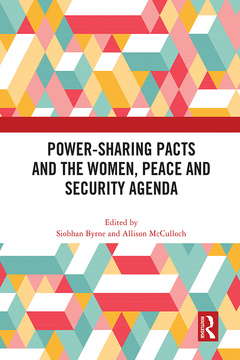Power-Sharing Pacts and the Women, Peace and Security Agenda
Coordonnateurs : Byrne Siobhan, McCulloch Allison

This book offers a comparative lens on the contested relationship between two leading conflict resolution norms: ethnopolitical power-sharing pacts and the women, peace and security (WPS) agenda.
Championed by national governments and international organizations over the last two decades, power-sharing and feminist scholars and practitioners tend to view them as opposing norms. Critics charge that power-sharing scholars cast gender as an inconsequential political identity that does not motivate people like ethnonationalism. From a feminist perspective, such thinking serves the interests of ethnicized elites while excluding women and other marginalized communities from key sites of political power. This edited volume takes a different tack: while recognizing the gender gaps that still exist in power-sharing theory and practice, contributors also emphasize the constructive engagements that can be built between ethnopolitical power-sharing and gender inclusion.
Three main themes are highlighted:
- The ?gender silences? of existing power-sharing arrangements
- The impact of gender activism and advocacy on the negotiation and implementation of power-sharing pacts in divided societies
- The opportunities for linkages between power-sharing and the women, peace and security agenda.
The chapters in this book were originally published as a special issue of the journal Nationalism and Ethnic Politics.
Introduction: Is Power-Sharing Bad for Women? 1. Power-Sharing, Conflict Resolution, and Women: A Global Reappraisal 2. Navigating Consociationalism's Afterlives: Women, Peace and Security in Post-Dayton Bosnia-Herzegovina 3. The Impact of Women's Activism on the Peace Negotiations in Cyprus 4. Female Party Attachment in a Power-Sharing Polity: The Erosion of Protestant Support in Northern Ireland 5. Between Co-Option and Radical Opposition: A Comparative Analysis of Power-Sharing on Gender Equality and LGBTQ rights in Northern Ireland and Lebanon 6. Allies or Opponents? Power-Sharing, Civil Society, and Gender 7. The Feminist Institutional Dimensions of Power-Sharing and Political Settlements
Siobhan Byrne is Associate Professor of Political Science and Director of the Certificate in Peace and Post-Conflict Studies at the University of Alberta, Edmonton, Canada. Her teaching and research focus on post-conflict transitions to peace, feminist anti-war activism and feminist interventions in International Relations.
Allison McCulloch is Associate Professor of Political Science at Brandon University, Manitoba, Canada. Her research considers the design of power-sharing arrangements, their incentives for moderation and extremism and whether they can be made more inclusive of identities beyond the ethno-national divide.
Date de parution : 09-2023
17.4x24.6 cm
Date de parution : 11-2021
17.4x24.6 cm
Thèmes de Power-Sharing Pacts and the Women, Peace and Security Agenda :
Mots-clés :
UN; National Action Plans; Civil Society; Consociational Structures; Gender Equality; NIWC; Consociational Power Sharing; CEDAW; Ethnic Outbidding; LGBTQ Right; Ethnonational Groups; Political Power Sharing; Party Attachment; Consociational Theory; Ethnonational Identities; Corporate Consociations; LGBTQ Group; Protestant Women; Ethnic Tribune; Women's Civil Society; post-Agreement Northern Ireland; Elected Women Representatives; Territorial Power Sharing; Civic Forum; Catholic Women



